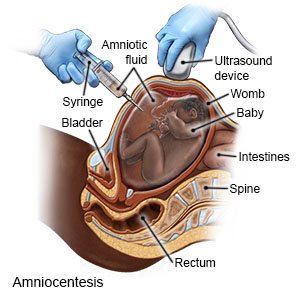Neural Tube Defects
Medically reviewed by Drugs.com. Last updated on Jun 5, 2024.
AMBULATORY CARE:
Neural tube defects
are birth defects that affect the brain and spinal cord. During development of the fetus, the neural tube develops into the spinal cord, brain, and spinal column. This neural tube normally closes within the first month of pregnancy. A neural tube defect develops when the neural tube does not close completely.
Common types of neural tube defects:
- Spina bifida occurs when the vertebrae (bones) in the spine do not form correctly. The spine does not close completely around the spinal cord. Spina bifida has several types. Each type may affect your child in a different way. Spina bifida may be open or closed. Open means the spinal cord nerves may are exposed or form outside the vertebrae or skin.
- Anencephaly occurs when major parts of the brain, skull, and scalp are missing. A fetus with this condition usually does not survive for very long after birth.
- Encephalocele occurs when brain tissue is pushed through part of the skull. Usually skin covers the area.
Causes or risk factors for neural tube defects:
The cause of neural tube defects is unknown. Your risk for having a baby with a neural tube defect is higher if you also have a neural tube defect. The following may also increase your risk:
- A past pregnancy with a baby with a neural tube defect
- Family history of a neural tube defect
- Use of antiseizure medicines before and during pregnancy
- Obesity or diabetes
- Low intake of folic acid before pregnancy
Diagnosis of neural tube defects:
Screening tests may show an increased risk for a neural tube defect. Genetic tests are not always accurate or complete. Your baby may be born with a neural tube disorder or other genetic disorder even after a negative test. If screening tests do show an increased risk, you may need more tests:
- Chorionic villus sampling is done during the first trimester (9 to 11 weeks). A sample of cells from the placenta is taken to examine the chromosomes.
- Amniocentesis is done during the second trimester (16 to 18 weeks). A sample of the fluid surrounding the baby is taken to examine the chromosomes.

- A detailed ultrasound may be taken of the baby's spine and skull.
- An ultrasound, CT scan, or MRI may be done to diagnose spina bifida after birth.
Treatment
may not be needed for mild spina bifida. Surgery can be done to close or place the spinal cord back into the vertebrae. Surgery may be done during pregnancy or after birth. After surgery, long-term care will be needed to treat conditions or disabilities caused by spina bifida.
Help prevent neural tube defects:
Talk to your healthcare provider if you are of childbearing age and plan to have a child. Your provider can help you with the following:
- Take 400 to 800 micrograms (mcg) of folic acid each day. You can get folic acid from prenatal vitamins, a multivitamin, or folic acid supplements. You may need up to 4,000 micrograms (mcg) each day if you have had a child with a neural tube defect. Your provider will tell you how much to take. If possible, start taking folic acid 1 month before you become pregnant. Take folic acid for the first 2 to 3 months (8 to 12 weeks) of pregnancy.

- Manage risk factors that can cause a neural tube defect. Your provider can help you manage health conditions such as diabetes or seizures. Your provider can make any needed changes to medicines that can cause a neural tube defect. Ask what a healthy weight is for you. Your provider can help you create a safe weight loss plan, if needed. It is best to reach and maintain a healthy weight before you become pregnant. Your provider will tell you how much weight to gain during pregnancy.
Good sources of folic acid:
Folic acid is vitamin B9. Your healthcare provider may recommend that you eat foods high in folic acid. The following foods are good sources of folic acid:
- Flour and bread
- Breakfast cereal
- Pasta
- Corn tortillas, tortilla chips, taco shells, and tamales
- White rice
- Beans
- Leafy green vegetables
- Orange juice
 |
Follow up with your doctor or obstetrician as directed:
Write down your questions so you remember to ask them during your visits.
© Copyright Merative 2024 Information is for End User's use only and may not be sold, redistributed or otherwise used for commercial purposes.
The above information is an educational aid only. It is not intended as medical advice for individual conditions or treatments. Talk to your doctor, nurse or pharmacist before following any medical regimen to see if it is safe and effective for you.
Learn more about Neural Tube Defects
Treatment options
Care guides
Further information
Always consult your healthcare provider to ensure the information displayed on this page applies to your personal circumstances.
